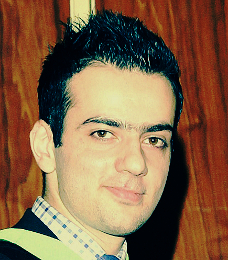Dr. Mohammed Ziaei, winner of the "Brian Harcourt" and "Elizabeth Hunt" medals, gives his pearls on how to pass the FRCOphth Part 2 exam
So you have decided to sit the exam you have been putting off for some time. Well done! When I sat the exam nearly 2 years ago, there was not much material regarding the content of the exam and the stye of the questions. I hope that my Part 2 package can give you an insight into the exam as well as a heads-up regarding what type of question style you are likely to encounter. There are at least 200 real life exam questions from previous sittings that I have recreated in this package to aid your preparation for what will hopefully be your last formal examination in your professional career. Here is my take on what you need to do to pass this exam:
1. Read the college guidelines on the contents of the written exam
There are 180 MCQ questions and they are spread over a variety of subjects. Identify the content list early and plan accordingly. It is important to carefully plan what you will review because you will soon discover that the syllabus is endless and you could spend a year to try to cover it and not succeed. As a general rule, concentrate on the main topics such as cornea, glaucoma, strabismus, paeds, uveitis, medical/surgical retina AND current guidelines. I would recommend you to avoid reviewing basic science questions apart from a few pertinent topics which I have tried to cover in the FRCOphth Part 2 package.
2. Pick the key resources to cover the syllabus
Once you have identified what areas
you need to cover, you then need to choose how you are going to cover the
syllabus. I would recommend the Oxford
Handbook as your “go to” book with Kanski acting as a back up where you
need further details. I would also recommend reading the last chapter
of the Oxford Manual of Training in Ophthalmology for an update on the
non-clinical issues that you need to be familiar with for the exam. It
goes without saying that Ophtho Questions is a fantastic resource to use
for the exam and one that I personally used for my preparation.
3. Read and understand the college guidelines
It is absolutely essential for you to
read and comprehend the college guidelines. This is as useful for the
written exam as it is for the clinical part of the exam. I would advise
you to skim through all college guidelines briefly and then focus on the
areas which can be converted into MCQ
questions. For example, one of the popular exam questions is that of management of
retinal vein occlusions and the investigations you as an ophthalmologist
are expected to carry out. But you need to be familiar with all of
them.
4. Review Statistics
Review statistical principles because
you will have around 5 questions purely focusing on this topic. There
are a a number of important statistical questions in the FRCOphth Part 2
package which will take you through the pertinent and relevant topics
regarding statistical analysis.
6. Review the basic principles of ophthalmic investigations
Review all the major ophthalmic
investigations and their basic principles. For example, Hess charts, CT/MRI, FFA, UBM,
topography, optic disc/retinal OCT and electro-diagnostics. There are usually a fair number of questions on these topic and it is not unknown for the
examiners to ask questions regarding the basic physical properties (e.g.
wavelength of light used for OCT imaging) of these techniques which are
now embedded in routine ophthalmic practice.
7. Think like the examiner and ask yourself why certain information is given
The exam is one that mainly focuses
on clinical aspects of ophthalmology. You should therefore make sure
that you are up to speed with day-to-day management of common clinical
scenarios including ophthalmic emergencies. This said, my experience with
the written part of the exam was that many of the questions were vague
and open to interpretation. Some of the clinical scenarios given were
long and included a detailed history, an array of examination findings,
and investigation results. I would ask you to think like the examiner
and ask yourself all the time, why have I been given this particular
piece of information in the question stem. For example, a real life
question mentioned that a physical trainer presented to A&E with
swollen optic discs. The only clue with
regards to you choosing the correct diagnosis (of space occupying lesion instead of idiopathic intracranial hypertension) would have been your careful
review of the question and subsequent conclusion that this patient was
unlikely to be overweight as a physical trainer.
8. Do not over-think the easy questions!
This
exam, like the previous ones you have sat, comprises of a small list of
easy questions, a large pool of medium difficulty questions as well as a
small pool of very difficult questions. My advice would be to try your
best to score highly on the easy questions so that you give yourself the
best chance of passing. It is important to not over-think or over-complicate these easy questions as you can easily find yourself on the
wrong side of the
pass-mark normal distribution curve. You might also want to know that
there are usually a few picture-based questions onn the exam so be
prepared to interpret a B-scan or a Hess chart in the written as well as
the practical part of the exam.
9. Review summaries of all major trials
Read the summaries of all major
trials in ophthalmology whether they are recent or old as they are
popular with the examiners. There is no two ways about this -- you need to
know some numbers for this exam (e.g. the 5-year glaucoma conversion
rate of ocular hypertensive patients in the OHTS trial).
10. Watch the clock
As a final piece of advice, I urge you
to be extremely time conscious with this exam as I nearly ran out of
time before finishing the second MCQ paper. Many of the questions are
somewhat long whilst others are ambitious in nature. Do not spend too long
on these particular questions and move on because you have to get
through 90 questions in 2 hours (i.e. a little more than a minute per
question). You will kick yourself if you spend forever on the difficult
questions that most people will fail to answer correctly anways and run out of
time to attempt the easy questions in the latter part of the paper.
Good luck!
1. Read the college guidelines on the contents of the written exam
There are 180 MCQ questions and they are spread over a variety of subjects. Identify the content list early and plan accordingly. It is important to carefully plan what you will review because you will soon discover that the syllabus is endless and you could spend a year to try to cover it and not succeed. As a general rule, concentrate on the main topics such as cornea, glaucoma, strabismus, paeds, uveitis, medical/surgical retina AND current guidelines. I would recommend you to avoid reviewing basic science questions apart from a few pertinent topics which I have tried to cover in the FRCOphth Part 2 package.2. Pick the key resources to cover the syllabus
Once you have identified what areas
you need to cover, you then need to choose how you are going to cover the
syllabus. I would recommend the Oxford
Handbook as your “go to” book with Kanski acting as a back up where you
need further details. I would also recommend reading the last chapter
of the Oxford Manual of Training in Ophthalmology for an update on the
non-clinical issues that you need to be familiar with for the exam. It
goes without saying that Ophtho Questions is a fantastic resource to use
for the exam and one that I personally used for my preparation. 3. Read and understand the college guidelines
It is absolutely essential for you to
read and comprehend the college guidelines. This is as useful for the
written exam as it is for the clinical part of the exam. I would advise
you to skim through all college guidelines briefly and then focus on the
areas which can be converted into MCQ
questions. For example, one of the popular exam questions is that of management of
retinal vein occlusions and the investigations you as an ophthalmologist
are expected to carry out. But you need to be familiar with all of
them. 4. Review Statistics
Review statistical principles because
you will have around 5 questions purely focusing on this topic. There
are a a number of important statistical questions in the FRCOphth Part 2
package which will take you through the pertinent and relevant topics
regarding statistical analysis. 5. Review the current GMC good medical practice guidelines to remind yourself of the important topics such as consent, capacity, ethical, etc
6. Review the basic principles of ophthalmic investigations
Review all the major ophthalmic
investigations and their basic principles. For example, Hess charts, CT/MRI, FFA, UBM,
topography, optic disc/retinal OCT and electro-diagnostics. There are usually a fair number of questions on these topic and it is not unknown for the
examiners to ask questions regarding the basic physical properties (e.g.
wavelength of light used for OCT imaging) of these techniques which are
now embedded in routine ophthalmic practice. 7. Think like the examiner and ask yourself why certain information is given
The exam is one that mainly focuses
on clinical aspects of ophthalmology. You should therefore make sure
that you are up to speed with day-to-day management of common clinical
scenarios including ophthalmic emergencies. This said, my experience with
the written part of the exam was that many of the questions were vague
and open to interpretation. Some of the clinical scenarios given were
long and included a detailed history, an array of examination findings,
and investigation results. I would ask you to think like the examiner
and ask yourself all the time, why have I been given this particular
piece of information in the question stem. For example, a real life
question mentioned that a physical trainer presented to A&E with
swollen optic discs. The only clue with
regards to you choosing the correct diagnosis (of space occupying lesion instead of idiopathic intracranial hypertension) would have been your careful
review of the question and subsequent conclusion that this patient was
unlikely to be overweight as a physical trainer. 8. Do not over-think the easy questions!
This
exam, like the previous ones you have sat, comprises of a small list of
easy questions, a large pool of medium difficulty questions as well as a
small pool of very difficult questions. My advice would be to try your
best to score highly on the easy questions so that you give yourself the
best chance of passing. It is important to not over-think or over-complicate these easy questions as you can easily find yourself on the
wrong side of the
pass-mark normal distribution curve. You might also want to know that
there are usually a few picture-based questions onn the exam so be
prepared to interpret a B-scan or a Hess chart in the written as well as
the practical part of the exam. 9. Review summaries of all major trials
Read the summaries of all major
trials in ophthalmology whether they are recent or old as they are
popular with the examiners. There is no two ways about this -- you need to
know some numbers for this exam (e.g. the 5-year glaucoma conversion
rate of ocular hypertensive patients in the OHTS trial).10. Watch the clock
As a final piece of advice, I urge you
to be extremely time conscious with this exam as I nearly ran out of
time before finishing the second MCQ paper. Many of the questions are
somewhat long whilst others are ambitious in nature. Do not spend too long
on these particular questions and move on because you have to get
through 90 questions in 2 hours (i.e. a little more than a minute per
question). You will kick yourself if you spend forever on the difficult
questions that most people will fail to answer correctly anways and run out of
time to attempt the easy questions in the latter part of the paper. Good luck!
Want to get more from OphthoQuestions?








Please login to comment.
thank you
thank you